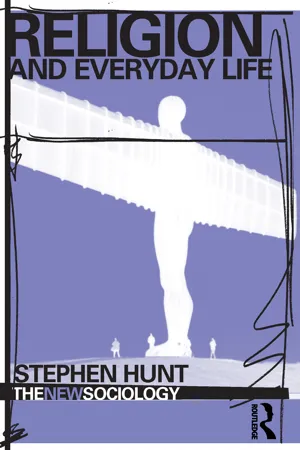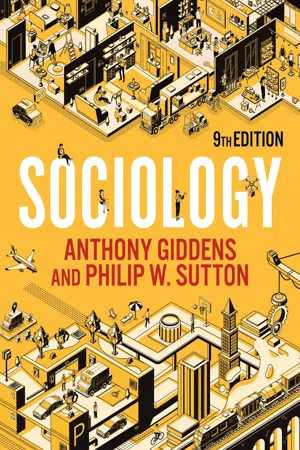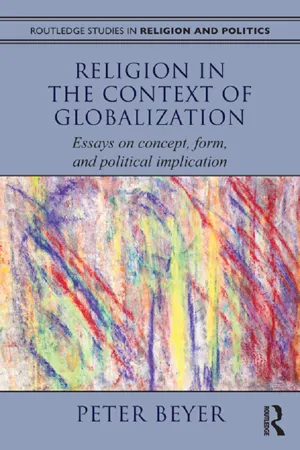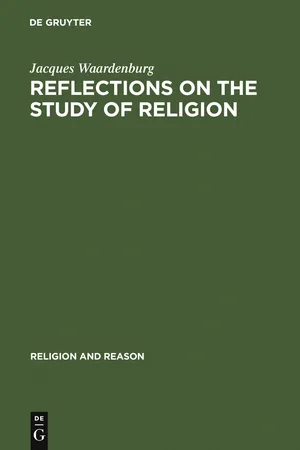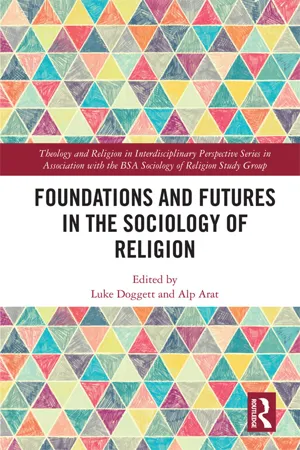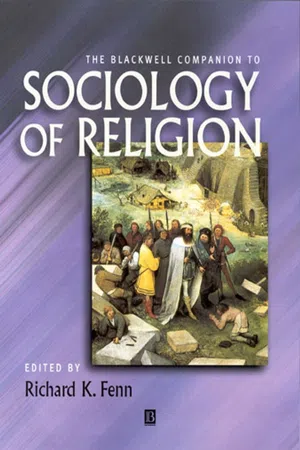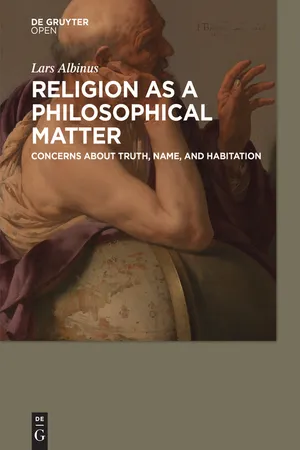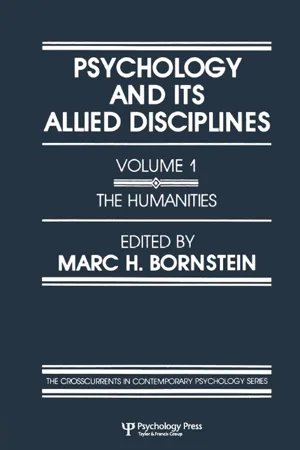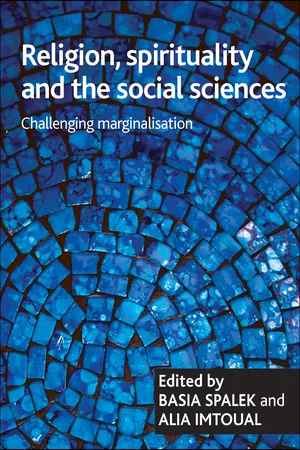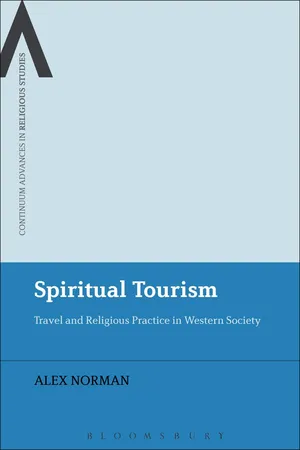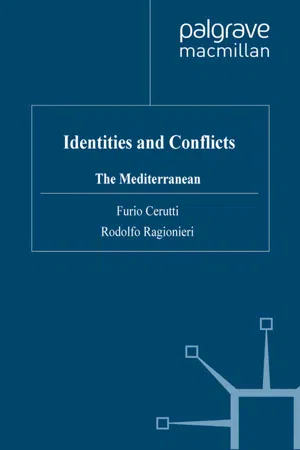Social Sciences
Contemporary Religion
Contemporary religion refers to the current state and practice of religious beliefs and traditions in modern society. It encompasses the diverse range of religious expressions, rituals, and spiritual beliefs that exist in the present day. This term is used to understand the evolving nature of religion and its impact on individuals and communities in today's world.
Written by Perlego with AI-assistance
Related key terms
1 of 5
11 Key excerpts on "Contemporary Religion"
- eBook - ePub
- Stephen Hunt(Author)
- 2013(Publication Date)
- Routledge(Publisher)
1Contemporary Religion
CHANGING DEFINITIONS
DEFINITIONS OF RELIGION
The matter of the nature and significance of religion in contemporary Western societies, and debates regarding possible decline or resurgence, open up broader questions regarding its definition which, in turn, relate to on-going ideological debates as to the merits or otherwise of religious life. In terms of definitions, the sociology of religion faces a unique set of conceptual difficulties which are enhanced by the increasing variety and ever-changing expressions of religiosity, especially their apparent increasing reduction to the individual and privatized level. Thus, only when it is defined can religion be delimited in terms of the subject matter, the trajectories of its transformation understood, and the conjecture that certain forms are experiencing growth, be put in rightful perspective. This is an important endeavour, especially in relation to current sociological theorizing which departs so radically from the conventional secularization thesis.To be sure, the human capacity for belief is seemingly endless, and in Western societies today there would appear to be a vast range of belief systems, some very loosely articulated. Alongside mainstream Christianity are the world religions or a particular tradition of them as embraced by many ethnic groups, one variety or another of fundamentalism, New Religious Movements and those not so new, and the diverse New Age phenomenon and related forms of spirituality. To these might be added the ‘implicit’ or ‘quasi’ religions — those social phenomena which are ‘like’ religions in some way but which may not include all the usual attributes and perhaps may not even be accepted as a ‘religion’ by participating social actors. Such diversity renders a discussion of religion, especially at the level of everyday life, a demanding challenge. To some extent this is because it is virtually impossible to differentiate between what is ‘in’ and what is ‘out’, that which can correctly be called religion and that which cannot. This is compounded by the problem of measuring the impact of religiosity at the everyday level — a problem further accentuated by the changing cultural perception of the word ‘religion’ itself. Put succinctly, the term appears to have gone out of vogue, with ‘spirituality’ often being preferred, not least of all by those who themselves seek to indulge in new forms. - eBook - ePub
- Anthony Giddens, Philip W. Sutton(Authors)
- 2021(Publication Date)
- Polity(Publisher)
The sociology of religion places special demands on our sociological imagination as we look to understand the diversity of beliefs and rituals found in human societies. This means we have to be sensitive to the ideals that inspire profound conviction in believers, yet at the same time we must be relatively detached from our personal beliefs. Sociologists confront ideas that seek the eternal, while recognizing that religious groups also pursue very mundane goals, such as acquiring finance or gaining followers. We also need to recognize the diversity of religious beliefs and modes of conduct and to probe into the nature of religion as a general social phenomenon.What is religion?
Defining religion seems to be such a simple task as to merit no deep thought. Religions are commonly defined by a belief in God or gods and perhaps an afterlife, but they also involve worship in religious buildings – temples, churches, synagogues or mosques – and doing ‘religious things’ such as praying and eating or not eating certain foods. For sociologists trying to set limits to their field of study, reaching general agreement on such a basic matter has proved extraordinarily difficult. Indeed, Aldridge (2013: 22) argues that ‘We cannot expect to agree on a definition and then debate matters of substance, since matters of substance are built into any definition. There is not, and never will be, a universally agreed definition of religion.’One reason for this is that sociology contains numerous theoretical perspectives, and these differ in how they construe the nature of social reality. As a consequence, they also disagree about how that reality can and should be studied. For example, many macro-level studies adopt a realist view which sees religion as a fundamental social institution that transmits values, a moral code and norms of behaviour across generations. Hence ‘religion’ exists objectively and has real effects on individuals. Alternatively, several other micro-level studies are rooted in a more social constructionist position, which focuses on the ways in which what constitutes ‘religion’ is continually reproduced and changed in everyday interaction processes. - eBook - ePub
Religion in the Context of Globalization
Essays on Concept, Form, and Political Implication
- Peter Beyer(Author)
- 2013(Publication Date)
- Routledge(Publisher)
1 Religion in the Context of Globalization A developing theoretical perspectiveThis book brings together ten previously published pieces which focus on the institutional forms and concept of religion in the context of globalizing and modern society. The guiding theme that they all share is the theoretical proposition that religion and globalization are historically, conceptually, and institutionally related. What has come to constitute religion socially and what social roles religion plays are not manifestations of a timeless essence, a stable analytic category, or even a requirement of human societies. In concept and institutional form, socially religion is a contingent expression of the historical process of globalization, above all during modern centuries; what religion has become is one of the outcomes of the successive transformations and developments that have brought about contemporary global society.The different chapters share this theme, but each of them also treats different aspects of the overall issue. Together, it is hoped, they present a reasonably complete picture of a theoretical perspective that I have tried to develop since the early 1990s and even to some extent before. That said, it is important to situate the collection with reference to other of my own work on the same theme, and in temporal terms as steps along the way of an ongoing theoretical effort. I attend to each of these in turn.The pieces that provide the content of the following ten chapters were published originally between 1998 (Chapter 8 ) and 2010 (Chapter 12). The earliest summary attempts to present the basic position with regard to religion, religions, and globalization appeared in publications right at the beginning of this period (see Beyer, 1998a, 1998b), and these, in turn, grew out of conference papers delivered in the four preceding years. The fact that these efforts occurred after the publication of Religion and Globalization in 1994 (Beyer, 1994) points to a process of ongoing theoretical development. That book, in spite of its title, dealt with only certain aspects of the larger question, mainly those concerning the possibilities for “public (usually political) influence” for religion under conditions of globalization. It dealt very little with religion as religion. It was to this latter issue that I subsequently turned, to a large extent in the form of the chapters included in this book. This continuity of theme manifests itself in the fact that there is a degree of overlap in these chapters, and this even after most of the evident repetition was removed in the process of editing them for this collection. There is in that regard also a close relation between the present work and the 2006 volume, Religions in Global Society (Beyer, 2006), the purpose of which was quite similar to the present one. The main difference between the two is that there are aspects treated in one that are not or only sparsely treated in the other; but above all the 2006 book placed a very heavy emphasis on the development and presentation of a theoretical frame which included very centrally the adaptation of some of Niklas Luhmann’s theories for this enterprise.1 - eBook - PDF
Reflections on the Study of Religion
Including an Essay on the Work of Gerardus van der Leeuw
- Jacques Waardenburg(Author)
- 2011(Publication Date)
- De Gruyter(Publisher)
Among Christians, religious discussions are endless; not only on doctrinal and ecclesiastical matters, but also on the social implications of faith and on ethical issues in general. On a larger scale too, the relations between Christians, Jews and Muslims, and between religious people in general, are becoming a new subject of discussion beyond the traditional classificatory schemes. The sociological interest of such present-day religious discussions lies primarily in their growing concern for social reality, including political issues like the Middle East conflict and the Vietnam war, anti-racism and different liberation movements. Apart from topics of a more political nature, three large areas of social reality can be discerned that are subjects of discussion in nearly all religious traditions today: 1) Facts of change, development and modernization of society; in other words, the fact that social reality is part of history and that it is caught in a movement beyond the explicit control of those involved and their leaders. Things change, and this change is generally identified as a process of progress or of regression. In whatever ways this fact may be approved or denounced, for religious people in particular it is a subject of continuing discussion. They have to take an attitude to it, since change not only affects man and society, but also the traditional interpretations of reality as offered by the different religions. At its heart lies the problem of whether man can or should be (ir)religious in changing times. 2) The fact of the progressive secularization of contemporary society, in con-nection with modernization or other changes. Different interpretations and evaluations of this process have been given, and it has led to much discussion among religious people. Those who identify religion with a religious tradition handed over from the past, tend to identify the process of secularization with a decline in religion as such. - Luke Doggett, Alp Arat(Authors)
- 2017(Publication Date)
- Routledge(Publisher)
Part IVReligious dimensions of social life
Passage contains an image
10 Researching the religious dimensions of social life
The sacred and the social uses of moral meaning in contemporary society
Gordon LynchAs the earlier sections of this book demonstrate, research in the sociology of religion has much to contribute to our understanding of important structures and processes in religious institutions and individual religiosity, as well forms of interaction between religious organisations and other fields of social life. The aim of this chapter is to delineate an area of research within the contemporary sociology of religion that has arguably been less well-developed than this work on the religious lives of individuals and organisations, but which constitutes an important area for future work.A central assumption of much work in the sociology of religion over the past forty years is that it most naturally focuses on beliefs, practices, organisations and social structures and processes that relate to human engagement with supra-human beings or forces.1 This substantive understanding of religion under-writes the continued interest in the sociological study of major religious traditions as well, in recent decades, as the discipline’s interest in new religious movements and the ‘new age.’ The emergence of the study of ‘nonreligion’ as an important area for attention more recently has not necessarily troubled this assumption in instances where this work focuses on organisations or forms of living that are defined as being distinct from those oriented towards such supra-human powers.The aim of this chapter is not to declaim this centre of gravity for our discipline in any way. This working assumption about its field of study, and the avoidance of protracted debates about disciplinary focus and identity, has provided a valuable basis for researchers to develop our understanding of contemporary religious life across a range of traditions and contexts. The intellectual, ethical and political significance of resourcing more nuanced academic and public understandings of religion cannot be understated.- Richard K. Fenn(Author)
- 2008(Publication Date)
- Wiley-Blackwell(Publisher)
The first looks very briefly at the nature of sociology and anthropology as modern disciplines that have always had a strong cross-cultural component. Comparison has been at the heart of these enterprises and this feature has affected the dominant understandings of religion as well. The second section then examines some of the more important sociological conceptions of religion with a view to understanding their strengths and limitations for undertaking cross-cultural study and indeed how they have been formulated more or less explicitly with such work in mind. The final section takes up various themes introduced in the previous two to discuss in what directions social theory needs to go now if it is to respond most self-consciously to the situation of religion(s) and culture(s) in contemporary world society. Sociology and Anthropology as Cross-cultural Disciplines in the Modern World Modern sociology, and indeed the social sciences more generally, have arisen during the last 200 years in the context of monumental social changes, first in Western society and then around the rest of the world as well. Sociology is both a response to those changes and a part of them. More specifically, sociology emerged as the scientific discipline most concerned with seeking to understand the transformations, and in particular how the “new” situation, dubbed “modern,” differed from the societies that had existed before. The time-distinction between “traditional” (before) and “modern” (now) is critical for understanding not only modern social theory, but also the conceptions of religion that we find in these. By contrast, anthropology, a very closely related field, became the discipline more concerned with understanding those places and social groups that existed in modern times, but were seen by Western social-scientific observers as having the characteristics of the traditional societies that came before.- eBook - PDF
Religion as a philosophical matter
Concerns about truth, name, and habitation
- Lars Albinus(Author)
- 2016(Publication Date)
- De Gruyter Open Poland(Publisher)
3 Philosophy of Religion as a Social Phenomenon Philosophy of religion is a social phenomenon just as religion is a social phenomenon and thus the two are found on the same plane of existence. This is trivial, of course, and it doesn’t prevent us from investigating religion (nor philosophy for that matter), just as we are used to investigate the transactions of value in Economy and institu-tions of law and power in Political Science. The fact that we are part of the reality we behold doesn’t preclude us from perceiving things and sometimes seeing things that internally committed participants don’t see themselves. What the basic condition of our position calls for, more than anything else, is a balanced interaction between understanding and explanation.70 Nevertheless, the Study of Religion differs from other fields of investigation such as Economy, Political Science, Studies of Literature and Art, primarily because of the ontology invested in it. We can engage in social, and various interpretative, sciences without being involved in questions about ontology, that is, the range and nature of existing entities. Yet, religion is about how we humans basically conceive of the world, and therefore incommensurable ideas of existence are at stake in what is generally regarded as an unbridgeable gab between religion and science.71 To speak of religion as an aesthetic or a psychological phenomenon, or even as an anthropological phenomenon, misses the real engagement underlying all inter-actions with religion, namely the question of truth, not about religion, but of reli-gion. In other words, what is at stake, are questions about ultimate existence and the determination of our existence as human beings (regarded as questions from our point of view, that is). - eBook - ePub
Psychology and Its Allied Disciplines
Volume 1: Psychology and the Humanities
- M. H. Bornstein(Author)
- 2019(Publication Date)
- Psychology Press(Publisher)
21 ].” Secularization, the decline of religion as a social institution, has been connected with the rise of sciences: Since the days of Giordano Bruno and Galileo, the natural sciences have demolished the religious cosmology, and the biological sciences have demolished the religious view of man in the natural world. But it was left to the social sciences and psychology to examine the nature of religious beliefs, their development, and their relativity, and in this way to deal a final blow to the credibility of religious claims (Cattell, 1938). Moreover, the decline of religion is especially tied to the social sciences’ examination of the social order, often legitimized by religion. Thus, the social sciences have very clearly followed the Comtean model replacing religious traditions with new, rational, and systematic science. The social sciences especially threaten religion because they take religion as an object of study and not as a representation of a special reality or a special mode of knowledge. The social sciences study changes in culture over time and space and show that beliefs and customs, including religious ones, are relative and culturally conditioned (Glock & Stark, 1965) against traditional religious claims of universal validity. Psychology, as the discipline that deals directly with the nature of human beliefs, presents a most direct threat; first, it challenges and rejects the notions of the soul and free will, which are integral to religious traditions, and, second, it is part of the historical rise of science which challenges and makes less tenable the supernatural premise.Modern psychology, as Allport (1950) put it, is rather proud of being “a psychology without a soul,” thus representing a direct departure from religious tradition. Actually, the development of modern psychology would not have been possible without rejecting the ideal of the soul. The development of a scientific psychology has meant the naturalization and secularization of the soul, and finally its disappearance (Kantor, 1969).The process of psychologizing religion has paralleled the historical process of secularization. Religion is becoming more psychological (or psychologistic) in two senses. The first sense is that of emphasizing personal experience and personal faith rather than communal experiences or meanings. It is the individual who is being offered salvation in modern religion (and modern psychology; cf. Beit-Hallahmi, 1974a) rather than the community or society as a whole. Religion has become an individual matter, with its tenets becoming more abstract. Instead of clear cosmological claims and world transformation, religion now offers believers individual psychological change. The second sense in which religion is becoming psychologized is that of its rapproachement with applied and clinical psychology.In historical perspective, the effects of religion on psychology seem obvious and preeminent. Psychology is the successor to religion in both scientific functions and social functions. Primitive theories of consciousness were a part of religion, until they were replaced by modern psychology. In their social and applied functions, modern psychological theories have acted to provide individuals with a secular meaning system, filling the “ecological niche” emptied by the decline of religion. Religion and psychology have remained competing, alternative meaning systems for some individuals even today. Many individuals in need of advice about personal difficulties turn first to their clergymen, rather than to the secular “helping professionals” (Gurin, Veroff, & Feld, 1960). The competition between religion and psychology as meaning systems, expressed in the scholarly work of psychologists, will be described below. - eBook - PDF
Religion, spirituality and the social sciences
Challenging marginalisation
- Spalek, Basia, Imtoual, Alia, Basia Spalek, Alia Imtoual(Authors)
- 2008(Publication Date)
- Policy Press(Publisher)
12 Religion, spirituality and the social sciences religion; scientific theories and the evidence for them, like political decisions and the interests they represent, are properly matters of public debate, but not religious rituals and their mythological rationales, because there is no agreed medium in which they can be expressed apart from that imposed on them from without by secular reason. In the new public space created by globalisation and the ‘real virtuality’ (Castells, 1996, pp 410-18; May, 2003, 2005) of electronic communications media, it is not so much the privatisation (retreat into interiority) of religious convictions as the individualisation (isolation in autonomy) of the culturally uprooted and disorientated that is making possible the new universalisms of the ‘next Christendom’ (Jenkins, 2002) or the ‘virtual ummah’ (Roy, 2004): cut off from ties to community and place by social mobility or emigration, individuals absorb the shock of individualisation by identifying with idealised, ahistorical versions of all-encompassing religious world-views such as those of Buddhism, Christianity and Islam. The obverse of this globalisation of the religious is the consolidation of localised groups of true believers who demand space in the public sphere to be exclusively themselves. It is at this point that the question of how to study religions in global public space becomes interesting.The founders of Religionswissenschaft took their scientific stand on comparativism and phenomenological method, a heritage which is indeed foundational for the discipline of Religious Studies, but in the context defined by orientalism and post-colonial theory this is increasingly regarded as a Western perspective which prematurely universalises ‘religion’ and approaches the religions as Christianity’s ‘religious others’ (King, 1999; Masuzawa, 2005). - eBook - PDF
Spiritual Tourism
Travel and Religious Practice in Western Society
- Alex Norman(Author)
- 2011(Publication Date)
- Continuum(Publisher)
Chapter 6 Contemporary Forms of Religious Life In order to understand the functions of spiritual tourism we must turn to the suite of cultural beliefs and practices, and trends in their individual iterations, which come under the umbrella term ‘spirituality’. Contemporary Religion and spirituality are phenomena that present delightfully frustrating problems for the social theorist. Their complex and nuanced forms defy universal defi-nitions and challenge methodological paradigms. Indeed, the social manifest-ations of what are called ‘religion’ and ‘spirituality’ are often slippery, elusive and sometimes transient or faddish. If the treatment of the subject of spirit-ual tourism is to prove meaningful and useful, it must set out what is meant by the appellation ‘spiritual’. Similarly, if the argument that spiritual tourism provides insight to the nature of the practices of travel and spirituality is cor-rect, then it must approach both subjects in ways that create a framework of understanding with which to then ‘look back’, as it were, to the greater social setting. What this chapter sets out is an understanding of the ways in which the set of social phenomena that are commonly referred to as ‘spirituality’ are conceived. In particular, it is an argument for understanding contemporary Western spiritual practice as being concerned with identity and meaning, prag-matic self-help and well-being, and post- geographic community building. Defining the ‘Spiritual’ in Spiritual Tourism An often heard phrase in the modern West goes along the lines of ‘I’m not reli-gious, but I’m spiritual’. When asked to explain what this means many people are at a loss and hunt for suitable terms, typically drawing upon words like ‘meaning’, ‘purpose’, ‘happiness’, ‘belief’, and ‘well-being’. We also often hear about the validity of multiple paths, and that one picks ‘what suits you’, giving a sense of it being personalized or individuated. - eBook - PDF
Identities and Conflicts
The Mediterranean
- F. Cerutti, R. Ragionieri, F. Cerutti, R. Ragionieri(Authors)
- 2001(Publication Date)
- Palgrave Macmillan(Publisher)
As for the second element, modern pluralism, it should be noted that it differs significantly from the group-in-ghetto pluralism of the Hellenistic period and the late Roman Empire. Social Forms of Religion 49 Different world views do not merely coexist in segregated social (for example, ethnic) groups within an overarching form of social organization such as an empire, the contacts between the groups being limited by (religious) law, social norms and custom. Modern pluralism is characterized by the fact that different world views become available to everyone, at least in principle although not in general practice. In a manner of speaking, in the contemporary variety of pluralism, the individual is not only permitted to make choices, he is forced to do so. There is a shift from an awareness of fate and destiny with regard to one's conduct of life to an awareness that most decisions are optional and could also have been made differently. This shift was promoted by the joint effects of a market economy and democracy. The dominance of transcendent realities in the conduct of ordinary life was slowly but effectively undermined. 6 The "modern" social form of religion is characterized by de-monopolization of the production and distribution of world views, including the specifically religious strata of collective representations. A growing number of different "actors" on the social scene began to articulate various kinds of experiences of transcendence and became involved in the social construction of religion. The structure of the production and distribution of (religious) collective representations is that of a relatively open "market". There is no overall censorship and no overall canonization of a world view for an entire society. Attempts at the imposition of censorship and promulgation of obligatory canons may at least partly succeed for a time in dictatorial regimes. In democratic states with a market economy this is hardly possible.
Index pages curate the most relevant extracts from our library of academic textbooks. They’ve been created using an in-house natural language model (NLM), each adding context and meaning to key research topics.
